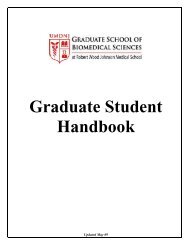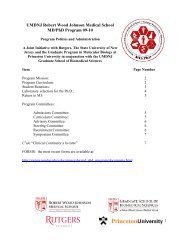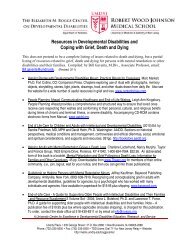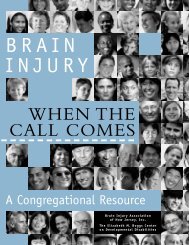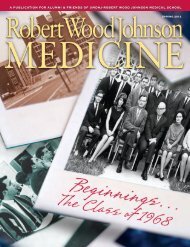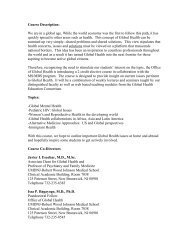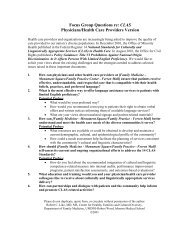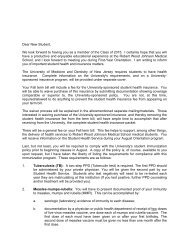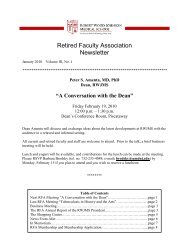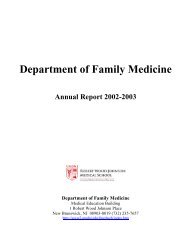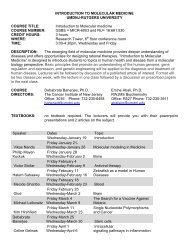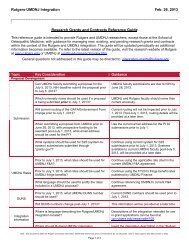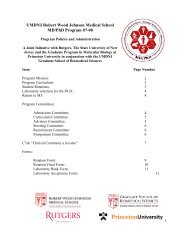Robert Wood Johnson Medicine • Spring 2011 • Population Science
Robert Wood Johnson Medicine • Spring 2011 • Population Science
Robert Wood Johnson Medicine • Spring 2011 • Population Science
You also want an ePaper? Increase the reach of your titles
YUMPU automatically turns print PDFs into web optimized ePapers that Google loves.
“<br />
A Lean, Cancer-Fighting Machine<br />
Despite a name that conjures images of Star Wars,<br />
the patented “Gamma Knife” is no movie prop —<br />
nor is it even a knife.<br />
In fact, the Leskell Gamma Knife “Perfexion” stereotactic<br />
radiosurgery system is a sharp, powerful, supremely<br />
advanced cancer-fighting machine that aims exceptionally<br />
focused radiation beams into the brain to combat<br />
tumors and other abnormalities.<br />
“This technology allows us to carefully guide radiation<br />
beams with extreme focus. That’s a key advantage because<br />
it’s this precision that helps ensure the beams directly hit<br />
their target without damaging healthy surrounding tissue,”<br />
says Shabbar F. Danish, MD ’01, assistant professor of surgery<br />
and director, stereotactic and functional neurosurgery,<br />
RWJUH.<br />
“This precision is a vast improvement over earlier generations<br />
of the Gamma Knife, which means we can now offer<br />
patientsa safer and more effective treatment option,” he adds.<br />
While the Gamma Knife technology has been in existence<br />
for some time, its newest and most advanced<br />
model, the “Perfexion,” was purchased in 2010 and was<br />
clinically operational in March <strong>2011</strong>, according to Ning<br />
Jeff Yue, PhD, professor and vice chair, Department of<br />
Radiation Oncology. It has been installed at RWJUH and<br />
radiation oncologists and medical physicists from The<br />
Cancer Institute of New Jersey will provide the radiotherapy<br />
services at the Gamma Knife Center at RWJUH.<br />
With nearly perfect accuracy, the Gamma Knife offers<br />
the most advanced protocol known for treating brain<br />
abnormalities and tumors, says Atif Khan, MD, assistant<br />
professor of radiation oncology. “It was the first machine<br />
developed that could localize with a high degree of precision<br />
small intercranial targets for pinpoint irradiation.<br />
The ‘Perfexion’ is even more advanced. It can localize and<br />
treat multiple targets in a very efficient and elegant way.”<br />
All three of these chief proponents of this technology<br />
will use the Gamma Knife “Perfexion,” along with specialized<br />
teams of radiation oncologists, neurosurgeons,<br />
and medical physicists.<br />
Where Cardiac Patients Turn for Hope<br />
There’s nothing more we can do.” These are probably<br />
the most difficult words any doctor must say<br />
to a patient, and this all-too-common sentence, or<br />
something like it, is uttered every day in countless hospitals<br />
and medical offices around the world.<br />
For cardiologists, it becomes necessary when a patient<br />
with end-stage heart disease or a member of the patient’s<br />
family anxiously looks to the doctor for other options, for<br />
next steps, for hope — when there are no other options,<br />
there are no next steps, there is no hope — because the<br />
patient is simply not eligible for that last-resort option, a<br />
human heart transplant.<br />
Although technology might never render these devastating<br />
conversations obsolete, medical breakthroughs are<br />
holding out the promise that one day there will be a<br />
diminished need for such a bleak moment.<br />
Cardiologists treating end-stage heart disease can now<br />
offer the promise of a new, life-enhancing possibility to<br />
some patients, thanks to an unusual collaboration involving<br />
a medical device manufacturer, the U.S. Food and<br />
Drug Administration (FDA), a skilled team of cardiac<br />
surgeons, and the extraordinary bravery of one man who<br />
briefly contributed to the advance of medical knowledge.<br />
That man was the 76-year-old recipient of the world’s first<br />
totally artificial heart approved by the FDA. Known as the<br />
AbioCor Total Replacement Heart, this fully implantable<br />
and self-contained device is capable of taking over when a<br />
patient’s own organ fails. The AbioCor was implanted in a<br />
patient for the first time in June 2009 at RWJUH. Mark<br />
Anderson, MD, associate professor of surgery and chief,<br />
division of cardiothoracic surgery at RWJMS and RWJUH,<br />
led the surgical team performing this precise, highly specialized<br />
procedure. Sadly, the first AbioCor patient survived for<br />
only a few months following surgery.<br />
In addition to its pioneering work with the AbioCor,<br />
RWJUH is among the first medical centers to offer another<br />
highly advanced treatment option for patients for whom<br />
a cardiac dysfunction may eventually prove reversible. This<br />
procedure involves inserting a tiny mechanical pumping<br />
device known as the Impella 5.0 — a new, miniaturized<br />
version of the typically permanent Left Ventricular Assist<br />
Device (LVAD) used today.<br />
Even more compelling than the cost-effectiveness of the<br />
Impella 5.0 are the patient health and recovery benefits<br />
that the device offers, according to Dr. Anderson.<br />
“One of the device’s main advantages is the time it<br />
buys for both patient and doctor, as it temporarily assists<br />
the heart in pumping blood until a patient’s condition<br />
and treatment options can be fully assessed,” he says. Dr.<br />
Anderson adds that the insertion procedure is much less<br />
invasive than it is for the LVAD; it involves introducing<br />
the catheter-based device into the aorta through small<br />
incisions in the patient’s groin area.<br />
“We have found that the Impella is useful as a temporary<br />
pumping aid, especially in cases where a patient is too<br />
ill for immediate corrective surgery,” says Dr. Anderson.<br />
“It’s also helpful in cases where a patient has just suffered<br />
a heart attack or when they’re recovering from surgery.”<br />
<strong>Robert</strong> <strong>Wood</strong> <strong>Johnson</strong> ■ MEDICINE 49



